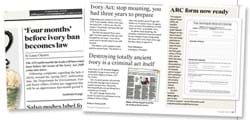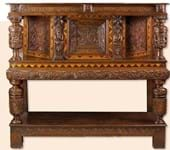Defra confirmed to ATG that there will be an “approximate four-month period from the opening of the registration and certification service [February 24], and the ban coming into force”.
This means the near-total ban on selling antique items containing ivory in the UK under the Ivory Act is expected to come in to force at some point in June.
Exemption certificates
Defra said: “We encourage dealers of ivory items to begin registering or certifying their exempted items as soon as possible so that they can become familiar with the process and register or acquire an exemption certificate for their items before the ban comes into force.”
However items sold before the enforcement of the ban is in place do not need to comply with these new exemption rules. But once the law is enforced it will be illegal to sell ivory works of art unless the item meets one of the five narrow exemptions and is registered or has an exemption certificate.
When an item is registered the applicant will get a reference number for it to be sold. When it has been certified an exemption certificate will be issued for the sale to be legal.
The Animal and Plant Health Agency (APHA) has the role of regulating the act and is responsible for checking registrations and applications.
The fee for registering will be £20 per item or £50 for a group of objects (up to a maximum of 20 if they are being sold to the same buyer and meet the same exemption). For the group registrations there is a form available which can be obtained from APHA at: ivoryact@alpha.gov.uk
The five exemptions are:
■ Pre-1947 items containing less than 10% ivory by volume.
■ Pre-1975 musical instruments containing less than 20% ivory by volume.
■ Pre-1918 portrait miniatures with a surface area of no more than 320 sq cm.
■ Sales to, and hire agreements with, qualifying museums.
■ Pre-1918 items with outstanding artistic, cultural or historical value.
However, applying to sell an antique (pre-1918) on the grounds it is of ‘outstandingly high artistic, cultural or historical value’ will be subject to a fee of £250, comprised of £20 for registration and £230 to cover the cost of expert advice provided by a committee of museum specialists.
The main guidance page called Dealing in items containing ivory is available alongside other pages such as a guide for buyers and for applying for exemptions.
Defra also reminded people that breaking the law could mean a maximum £250,000 fine or five years’ imprisonment.
Defra added: “We welcome your views and will be listening to your feedback as we seek to ensure these new regulations are fully understood and complied with.”
For the latest comment on the topic see Letters, page 59.














